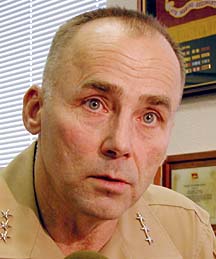
Fate of Okinawa base
rests on alliance
Asian needs must be weighed
before troops are moved to
Hawaii, a Marine chief says

|
And each country must decide what it wants to contribute to that alliance, said Lt. Gen. Wallace Gregson, who has just completed his first year as head of the largest command in the Marine Corps, which is responsible for 80,000 Marines and an area covering 105 million square miles.
"What is the situation that we are facing in Asia?" he asked, citing many other important questions that are potential challenges to the U.S.-Japan alliance.
He told reporters at his Camp Smith headquarters that the situation on the Korean peninsula remains "unresolved."
"China is a rising power," Gregson added. "We all hope it emerges in a peaceful and productive fashion, but nevertheless issues remain over energy resources, various territorial disputes and other things."
The rise of terrorism in Asia remains an unresolved issue.
Gregson said U.S. Sen. Dan Inouye earlier this year pointed out that "between Sept. 11, 2001, and November 2003, more people died of terrorist acts in Southeast Asia than in the Middle East."
Gregson said he agrees with Inouye that terrorism is "a rising problem in Asia" and that the U.S. needs to develop strategies with allies there "to eliminate the conditions that give rise to these terrorist organizations and give support to them."
The United States has been in Okinawa since 1945. In 1972, the island prefecture was returned to Japan. U.S. bases, with about 25,000 troops, cover about one-fifth of Okinawa's main island. U.S. and Japanese officials are in the middle of a process to return about 21 percent of that property.
About half of the U.S. troops in Japan are stationed on Okinawa, and residents there have long been demanding the United States reduce its presence on the island.
It's feasible to relocate Marines from Okinawa to Guam or Hawaii, where more than 7,000 Marines are stationed at Kaneohe Bay, Gregson said. He is "not opposed to any movement. But the movement has to have an operational foundation," he said.
Past proposals have ranged from moving some of the Marines to camps Fuji and Zama, both southwest of Tokyo, and Hokkaido in northern Japan.
The Aug. 13 crash of a Marine helicopter from Kaneohe Bay on a university campus on Okinawa, just outside the Marine Corps Air Station adjacent to Futenma, has re-ignited the call to close the base before a replacement facility is ready.
In 1996, the U.S. and Japanese governments agreed to close the air station within seven years if an alternate site for Marine air operations could be found. Henoko, a fishing community next to Camp Schwab in rural northeast Okinawa, was selected, but the project has been delayed because of opposition from environmentalists.
www.mcbh.usmc.mil
General lauds Kaneohe
troops’ contribution
to war on terror
With the departure of the second contingent of nearly 1,000 Kaneohe Marines next week to Afghanistan, Lt. Gen. Wallace Gregson said the troops here are making "a direct contribution to the war on terrorism."
The Kaneohe Marines from the 3rd Battalion, 3rd Marine Regiment -- commanded by Lt. Col. Norm Cooling -- will be assigned to Combined Task Force Thunder in central and eastern portions of Afghanistan for at least seven months. The Kaneohe Marines will be relieving the 3rd Battalion, 6th Marine Regiment, which will be returning to its home base at Camp Lejeune in North Carolina.
Another 1,000 Kaneohe Marines and aviators -- members of the 1st Battalion, 3rd Marine Regiment -- arrived in Iraq in mid-October as the ground combat element of the 31st Marine Expeditionary Unit.
Already eight Kaneohe Marines have been killed in Iraq. A memorial service for the seven Marines killed by a suicide car bomber on Saturday will be held at 11 a.m. Monday at the main chapel at Kaneohe Bay.
Another battalion of Marines -- about 1,000 troops -- remains at Kaneohe, Gregson said.
"We will continue to provide forces to the operational commanders there. It's hard to predict which way things are going to go, but as long as the operational commanders have a need (for) forces, and as long we can provide forces on sustained basis, we will do that.
Gregson visited Iraq two months ago. In December, the three-star general will make another trip to the area.
www.mcbh.usmc.mil